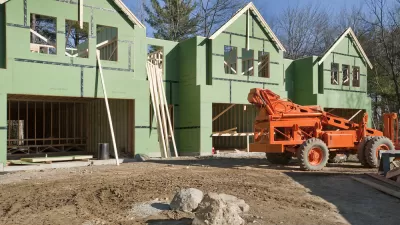After a slow start to the program, the city has distributed 91 percent of the housing vouchers issued through the American Rescue Act. Now housing agencies must help recipients actually find housing.

New York City has distributed almost all of the federal rental assistance vouchers provided by the American Rescue Plan, after only issuing less than one-third of the vouchers by March. As David Brand reports in City Limits, “The city agencies and nonprofits helping to administer the program blamed the initial distribution and lease up delays on onerous federal requirements, staff shortages and the challenge of linking various agencies that serve homeless New Yorkers.”
According to Brand, “Similar distribution delays were seen across the country, as local housing authorities slowly navigated the eligibility rules and began issuing the subsidies. Senior HUD officials told reporters Tuesday that the program is now on track for full ‘lease-up’—all 70,000 vouchers used to rent permanent housing—by the end of 2023.”
“To unlock more housing options, [the New York Department of Housing Preservation and Development] has urged developers to set aside units for people with EHVs in buildings created with city financing or subject to Mandatory Inclusionary Housing rules, which force owners to cap rents for people making a portion of the area median income. The city has also hired more than 80 housing navigators to help recipients find housing by identifying units and negotiating with landlords.”
Brand notes that “Federal funding for the EHVs will run out by 2030 without a re-appropriation from Congress,” but local lawmakers are confident that funding will likely be renewed.
FULL STORY: After Slow Start, NYC Issues Thousands of Federal Housing Vouchers

Maui's Vacation Rental Debate Turns Ugly
Verbal attacks, misinformation campaigns and fistfights plague a high-stakes debate to convert thousands of vacation rentals into long-term housing.

Planetizen Federal Action Tracker
A weekly monitor of how Trump’s orders and actions are impacting planners and planning in America.

In Urban Planning, AI Prompting Could be the New Design Thinking
Creativity has long been key to great urban design. What if we see AI as our new creative partner?

King County Supportive Housing Program Offers Hope for Unhoused Residents
The county is taking a ‘Housing First’ approach that prioritizes getting people into housing, then offering wraparound supportive services.

Researchers Use AI to Get Clearer Picture of US Housing
Analysts are using artificial intelligence to supercharge their research by allowing them to comb through data faster. Though these AI tools can be error prone, they save time and housing researchers are optimistic about the future.

Making Shared Micromobility More Inclusive
Cities and shared mobility system operators can do more to include people with disabilities in planning and operations, per a new report.
Urban Design for Planners 1: Software Tools
This six-course series explores essential urban design concepts using open source software and equips planners with the tools they need to participate fully in the urban design process.
Planning for Universal Design
Learn the tools for implementing Universal Design in planning regulations.
planning NEXT
Appalachian Highlands Housing Partners
Mpact (founded as Rail~Volution)
City of Camden Redevelopment Agency
City of Astoria
City of Portland
City of Laramie





























